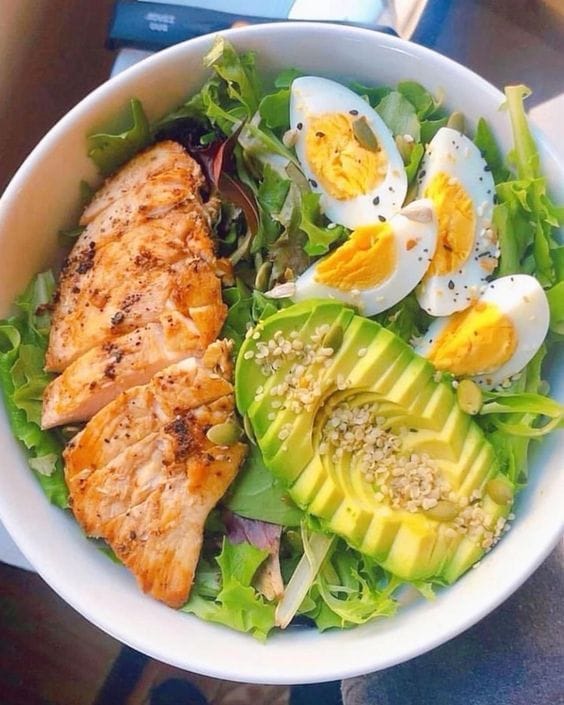If you're trying to conceive, it's essential to consume a diet rich in vitamins and minerals, including folate. Folate is a crucial nutrient for overall health, especially for women trying to conceive. It plays a vital role in the development of a healthy fetus and reduces the risk of birth defects. Folate is a water-soluble B-vitamin that is found naturally in many foods. In addition, folate is important for both men and women as it can improve fertility. Here are 17 high folate foods that can help boost your fertility.
1. Leafy greens
Some of the leafy greens that are high in folate include spinach, kale, collard greens, and lettuce. These greens are not only packed with folate, but also with other important vitamins and minerals such as iron, calcium, and vitamin C. Spinach, for example, contains about 58 mcg of folate per cup of cooked spinach, which is about 15% of the daily recommended intake for adults. Kale is another great option, with 19% of the daily recommended intake of folate per cup of cooked kale. Collard greens also provide a substantial amount of folate, with 177 mcg of folate per cup of cooked collard greens, which is around 44% of the daily recommended intake. Including leafy greens in your diet can be as simple as adding spinach to your morning smoothie, or tossing a handful of mixed greens into your lunch salad. These nutrient-packed vegetables are also versatile and can be used in a variety of dishes, from soups and stews to omelets and stir-fries.
2. Legumes
For women who are trying to conceive or are already pregnant, legumes are an excellent addition to the diet as they are a rich source of folate. For example, lentils are one of the best sources of folate, with 358 mcg of folate per cooked cup, which is approximately 90% of the daily recommended intake for adults. Chickpeas are also high in folate, with around 282 mcg of folate per cooked cup, which is about 70% of the daily recommended intake. A half-cup serving of cooked edamame contains around 95 mcg of folate, which is approximately 24% of the daily recommended intake for adults. Beans, such as black beans, kidney beans, and pinto beans, are also good sources of folate. A cup of cooked black beans contains around 256 mcg of folate, while a cup of cooked kidney beans provides around 230 mcg of folate. Peas, both green peas and split peas, are also rich in folate, with around 100 mcg of folate per cooked cup. Including legumes in your diet can be as simple as adding beans to your salad, making lentil soup for lunch, or snacking on roasted chickpeas. Legumes are also a great vegetarian protein source, making them an ideal food for vegetarians or those looking to reduce their meat consumption.
3. Eggs
Eggs are often considered one of the most versatile and nutritious foods around, and they are also a great source of folate. This essential B-vitamin plays a crucial role in fetal development, and consuming high folate foods like eggs can help support a healthy pregnancy. A large egg contains approximately 22 mcg of folate, which is around 6% of the daily recommended intake for adults. While this may not seem like a lot, eggs are also an excellent source of protein and other important nutrients such as vitamins D and B12, which are important for overall health and fertility. Eggs are also easy to prepare and can be included in lot of dishes, from breakfast scrambles and omelets to salads and sandwiches. Hard-boiled eggs are a convenient and portable snack, and they can also be used to make egg salad or deviled eggs. While eggs are a great source of folate, it's important to note that the amount of folate in an egg can vary depending on how the hen was fed. Hens that are fed a diet rich in folate will produce eggs with higher levels of folate. Therefore, it's a good idea to choose eggs from hens that are fed a healthy diet. Overall, eggs are a nutritious and convenient high folate food that can be a great addition to a fertility-boosting diet.
4. Beef liver
Beef liver is an excellent source of folate, a B-vitamin that is essential for fetal development and a healthy pregnancy. While liver may not be a food that everyone enjoys, it is one of the most nutrient-dense foods available, and it contains a variety of vitamins and minerals that are important for fertility and overall health. A 3-ounce serving of beef liver contains around 215 mcg of folate, which is over 50% of the daily recommended intake for adults. Beef liver is also high in iron, which is important for women who are trying to conceive or are pregnant, as it helps support the growth and development of the baby.
Beef liver can be prepared in many ways, from sautéing and grilling to roasting and braising. It can also be used as an ingredient in dishes such as meatloaf and pâté. While beef liver is a great source of folate, it is also high in cholesterol, so it should be consumed in moderation. Pregnant women should also be cautious about consuming too much vitamin A, which can be toxic in high amounts. However, including beef liver in a balanced and varied diet can be a healthy way to boost your folate intake and support fertility. While it may not be a food that everyone enjoys, incorporating beef liver into your diet can be a great way to support your fertility and overall health.
5. Avocado
Avocado is a delicious and nutritious fruit that is also a great source of folate. This essential B-vitamin plays a crucial role in fetal development and is important for overall fertility and reproductive health. A medium-sized avocado contains around 120 mcg of folate, which is approximately 30% of the daily recommended intake for adults. Avocado is also high in healthy fats, fiber, and other important nutrients such as potassium and vitamin E, making it an ideal food for those looking to support their fertility and overall health. Avocado can be used in a many dishes, from guacamole and toast to salads and smoothies. It is also a great substitute for mayonnaise and other high-fat spreads, making it a healthy addition to sandwiches and wraps. But it is also high in calories, so it should be consumed in moderation as part of a balanced and varied diet.
6. Citrus fruits
Citrus fruits such as oranges, grapefruits, and lemons are not only high in vitamin C, but they are also rich in folate, making them a great addition to a fertility-boosting diet. A medium-sized orange contains around 40 mcg of folate, which is approximately 10% of the daily recommended intake for adults. Other citrus fruits like grapefruit and lemons also contain significant amounts of folate, with a medium-sized grapefruit providing around 30 mcg and a lemon containing around 10 mcg of folate. Citrus fruits are also high in vitamin C, which helps support a healthy immune system and aids in the absorption of iron. They are also low in calories and high in fiber, making them a great snack or addition to a healthy meal. Citrus fruits can be eaten on their own or used in a variety of recipes, from fruit salads and smoothies to marinades and dressings. They can also be used to add a tangy flavor to savory dishes such as fish and chicken.
7. Asparagus
Asparagus is a great high folate food that can help support fertility and overall health. By incorporating asparagus into your diet, you can increase your folate intake and enjoy the many health benefits that this delicious vegetable has to offer. Asparagus is high in folate, and it is also a good source of other important nutrients such as fiber, vitamin K, and vitamin C. A half-cup serving of cooked asparagus contains around 134 mcg of folate, which is approximately 34% of the daily recommended intake for adults. Asparagus can be prepared in a variety of ways, from grilling and roasting to sautéing and steaming. It can also be used in salads, soups, and stir-fries.
8. Brussels Sprouts
Brussels sprouts are high in folate, fiber, vitamin C, and vitamin K. A half-cup serving of cooked Brussels sprouts contains around 47 mcg of folate, which is approximately 12% of the daily recommended intake for adults. Brussels sprouts are also low in calories and high in fiber, making them a great addition to a healthy and fertility-boosting diet. Brussels sprouts can roast and grilling to sautéing and steaming. They can also be used in salads and soups.
9. Broccoli
Broccoli is a delicious and nutritious vegetable. Broccoli is not only high in folate, fiber, vitamin C, and vitamin K. A half-cup serving of cooked broccoli contains around 52 mcg of folate, which is approximately 13% of the daily recommended intake for adults. Broccoli can be prepared in a variety of ways, from roasting and steaming to sautéing and stir-frying. It can also be used in salads and soups, adding a delicious and nutritious element to any dish.
10. Beets
Beets are a delicious and nutritious root vegetable that is also a great source of folate, a B-vitamin that is important for fetal development and reproductive health. Beets are not only high in folate, but they are also a good source of other important nutrients such as fiber, potassium, and vitamin C. A half-cup serving of cooked beets contains around 68 mcg of folate, which is approximately 17% of the daily recommended intake for adults. Beets can be prepared by roasting and boiling to grilling and blending into smoothies and adding in to salads and soups.
11. Papaya
Papaya is a sweet and juicy tropical fruit that is rich inf folate, vitamin C, vitamin A, and fiber. A one-cup serving of papaya contains around 115 mcg of folate, which is approximately 29% of the daily recommended intake for adults. Papaya is also low in calories and high in antioxidants, making it a great addition to a healthy and fertility-boosting diet. Papaya can be eaten fresh, sliced or diced, or used in smoothies and salads. It can also be cooked in desserts or used in marinades and sauces.
12. Quinoa
Quinoa is a superfood that is packed with nutrients such as protein, fiber, iron, magnesium and is also a great source of folate. A one-cup serving of cooked quinoa contains around 40 mcg of folate, which is approximately 10% of the daily recommended intake for adults. Quinoa can be prepared in a variety of ways, from boiling and steaming to baking and stir-frying. It can also be used in salads and soups. While quinoa is a healthy and nutritious food, it is important to note that some people may be allergic to it. If you experience symptoms such as hives, itching, or difficulty breathing after eating quinoa, you should seek medical attention.
13. Sunflower seeds
Sunflower seeds are a nutritious and tasty snack high in folate, protein, healthy fats, and minerals like zinc and magnesium. A quarter-cup serving of roasted sunflower seeds contains around 82 mcg of folate, which is approximately 20% of the daily recommended intake for adults. Sunflower seeds can be eaten on their own as a snack or added to salads, smoothies, or baked goods. They can also be used to make homemade nut butter or added to granola or trail mix. And it is important to note that they are high in fat and calories, so it is best to consume them in moderation. Additionally, some people may be allergic to sunflower seeds, so it is important to be cautious if you have a nut or seed allergy.
14. Okra
Okra, also known as lady's fingers, is a nutritious vegetable that is a great source of folate. Okra is not only high in folate, but it is also a good source of other important nutrients such as fiber, vitamin C, and potassium. A one-cup serving of cooked okra contains around 37 mcg of folate, which is approximately 9% of the daily recommended intake for adults. Okra is also low in calories and can be easily incorporated into a fertility-boosting diet. Okra can be prepared in a variety of ways, from sautéing and frying to boiling and baking. It can also be added to soups and stews or used in salads and pickled dishes.
15. Almonds
Almonds are a delicious and nutritious nut. That is also a great source of folate, protein, healthy fats, and minerals like magnesium and calcium. A one-ounce serving of almonds contains around 14 mcg of folate, which is approximately 3.5% of the daily recommended intake for adults. Almonds can be eaten on their own as a snack or added to salads, smoothies, or baked goods. They can also be used to make homemade almond milk or added to granola or trail mix. Even almonds are a healthy and nutritious food, it is also high in calories, so it is best to consume them in moderation. Additionally, some people may be allergic to nuts, so it is important to be cautious if you have a nut allergy.
16. Bananas
Bananas are a delicious and convenient fruit that is also a great source of folate, a B-vitamin that is important for fetal development and reproductive health. Bananas are not only high in folate, but they are also a good source of other important nutrients such as fiber, potassium, and vitamin C. A medium-sized banana contains around 23 mcg of folate, which is approximately 6% of the daily recommended intake for adults. Bananas can be eaten on their own as a snack or added to smoothies, oatmeal, or baked goods. They can also be sliced and added to pancakes or waffles, or used as a natural sweetener in recipes.
17. Wheat germ
Wheat germ is a nutritious and versatile food. That is also contains fiber, protein, vitamin E and good amount of folate. A two-tablespoon serving of wheat germ contains around 40 mcg of folate, which is approximately 10% of the daily recommended intake for adults. Wheat germ can be added to smoothies, yogurt, or oatmeal, or it can be used as a topping for salads or roasted vegetables. It can also be used as a substitute for breadcrumbs in recipes or added to baked goods for an extra nutritional boost.
Final Words
In conclusion, incorporating high folate foods into your diet can have numerous health benefits, particularly for reproductive health and fertility. Folate is essential for fetal development and can also help to prevent birth defects, making it especially important for women who are pregnant or trying to conceive.
Thankfully, there are many delicious and nutritious high folate foods that are easy to incorporate into your diet, such as leafy green vegetables, legumes, eggs, beef liver, avocado, citrus fruits, asparagus, Brussels sprouts, edamame, broccoli, beets, papaya, quinoa, sunflower seeds, okra, wheat germ, almonds, and bananas. By including a variety of these high folate foods in your meals and snacks, you can boost your folate intake and support your overall health and fertility. However, it is important to note that a balanced and varied diet is key to achieving optimal health, so be sure to consult with a healthcare professional if you have any concerns about your nutritional needs.







